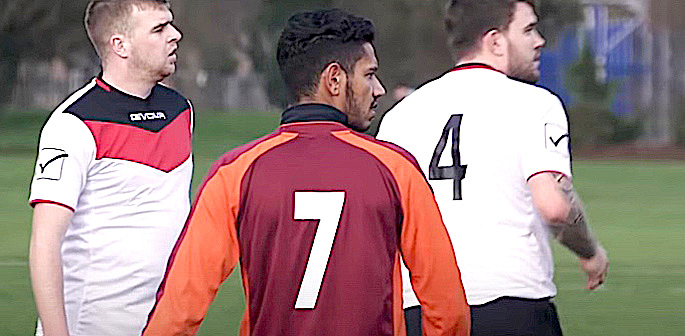"When I was younger, it made me want to stop playing football."
Football racism is an issue, which continues to plague the beautiful game. Whether racial slurs are hurled from the stands or on the pitch, football racism still exists.
For British Asians, football racism may be an undercover problem. A lack of professional representation often provides a cloak over the racism British Asians may face in football.
Look back at Euro 2020 when racial abuse towards England players from an ethnic background was clear to see.
However, a conversation on football racism in connection with British Asians may not be as widespread.
Unfortunately, racism within football is an issue, but to what extent does it affect British Asians?
DESiblitz examines racial prejudice, chanting, slurs whilst playing football, and what the future may hold as well as football racism, which may make the game less accessible for British Asians.
Growing Pains: Football Racism as a Youngster
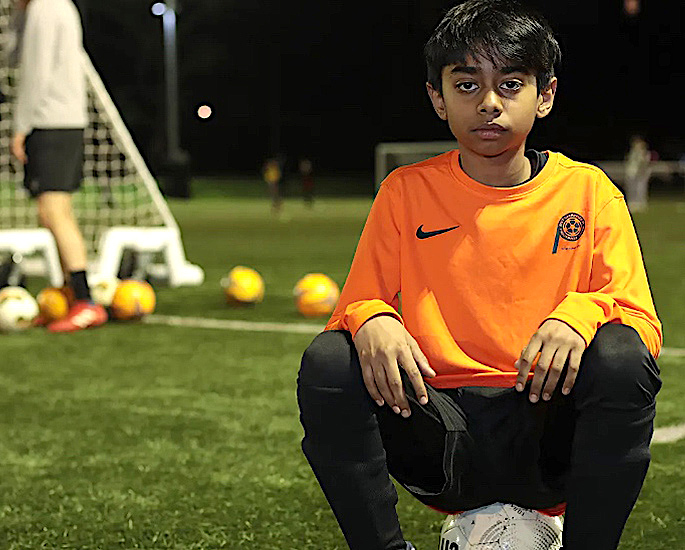
British Asians represent a passionate group of young footballers. In January 2020, Sport England published a report, titled Sport for all? – Why ethnicity and culture matters in sport and physical sport.
It found that children of Asian background in the UK made up 9.6% of the 5-16 age group. Comparatively, Asian children accounted for 10% of all football participation within their age group.
The statistics show that Asian children actively immerse themselves in football.
Additionally, Stefan Lawrence, a critical race theorist, reports that British Bangladeshi boys play football more regularly than their white counterparts.
Hence, we can safely say that British Asian children, on average, love playing football. So, If football racism is a problem for British Asians, do children experience or acknowledge it?
Faisal Chowdhury* is a British Bangladeshi and a former academy footballer. Faisal who became an architectural assistant spoke about his experiences with prejudice at an academy level:
“I wouldn’t say that ‘racism’ is the right word. It’s more of an underlying prejudice that is more accurate when talking about South Asians in the football community.
“I have played at a good level in Kent and London. Some teams were predominantly white, and others were mixed.
“I found that there was a hesitancy against myself and my peers, no matter the quality of player.
“From the first instance, before the coaches knew the quality of player, I found us not being able to get a fair chance.
“The coaches didn’t give us the same attention or take us that seriously. But, once we had a chance to kick a ball, the coaches would be much fairer. It was just difficult to get those initial chances.”
Faisal* went on to speak about whether his intuitive feelings of prejudice affected his love for football:
“Because I was young when I started playing, I didn’t fully realise what was happening; I just wanted to play.
“Playing football was all that mattered. When it got to under 16 levels, you can see the picture clearer.
“I saw guys I knew were good footballers try out for academy teams, and none of them got a fair shot.”
“Ultimately, those same players with a lot of potential gave up trying to play for the club.”
Faisal acknowledges racial prejudice as a young player. But as someone who was a part of successful London teams, he believes that coaches see British Asians in a particular light.
It is also damning to hear that some of his fellow British Asian players gave up on their dreams.
Football Racism or Football Prejudice?
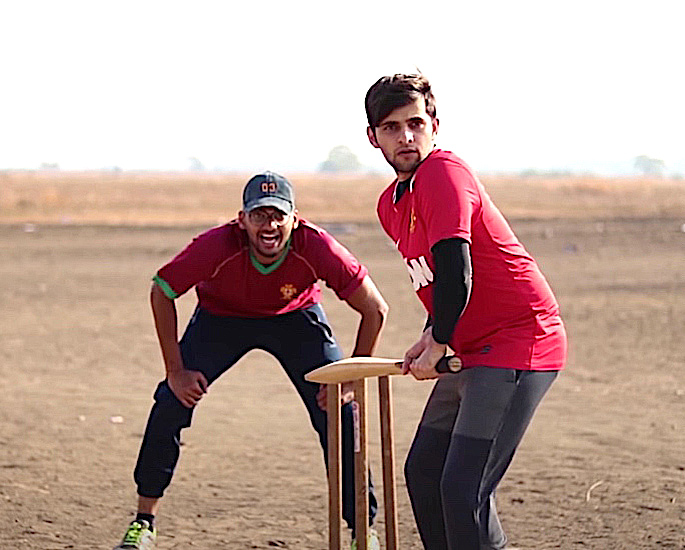
It is essential to separate prejudice from racism. Prejudice is a preconceived opinion. In Faisal’s* case, prejudice is to do with his race.
Despite the two concepts being separate, this situation has an inexplicable connection.
Arian Iqbal* is a 28-year-old ESOL lecturer at a college and a former academy player. Arian is a British Bangladeshi with a deep passion for the game.
Talking to DESIblitz, he elaborates on the impact of his identity:
“I think if I weren’t South Asian, I would have had a better chance to become a professional footballer. Of course, it’s hypothetical, but I think I would have had a better opportunity.
“I used to get coaches to tell me, ‘Shouldn’t you be playing cricket?’ People got picked ahead of me, and I don’t believe it was down to ability.
“I have played with Raheem Sterling and Oxlade-Chamberlain; I know my limitation wasn’t down to ability.
“We have very few South Asian professional footballers; I know it isn’t because of our talent.”
Arian feels something sinister limited his potential within the professional game. However, facing a comment about playing cricket is a racial stereotype with little evidence.
According to a DESIblitz poll, British Asian ranks football as their favourite sport; cricket came second.
These racial stereotypes hinder British Asians’ chances to break into the main stages of football. The two former academy footballers describe negative racial stereotypes, which acted against them.
Racial prejudice is more relevant when speaking about aspiring British Asian footballers. It was a prejudice based on their identities, which limited their ceiling within the game.
Slurs from the Stands: Do British Asians find the Terraces Daunting?

In 2003, Port Vale Football Club fans used racial slurs to describe people of Pakistani origin at Vale Park versus Oldham. But, of course, these chants were sung to people of South Asian origin.
Under the 1991 Football Offences Act, a 21-year-old man was found guilty. This was the first case of its kind to reach the High Court.
Since 1991, It has been a crime within the legal system to chant racist words during a football game. Similarly, an incident occurred in a match between Millwall and Everton at The Den.
In 2019, a video circulated on social media depicting Millwall fans behaving similarly to Port Vale fans in 2003.
Millwall issued a club statement in 2019, threatening to hand out lifetime bans for anyone caught singing the racist song.
Evidently, football racism shapes itself as abuse from the crowd.
The extent to which this is an issue for British Asians is up for debate. Hannah Kumari is a performer, writer and the creator of the thought-provoking production, ENG-ER-LAND.
Like her character in ENG-ER-LAND, Hannah grew up watching football from the terraces. DESIblitz spoke to Kumari about her thoughts on whether football racism reaches the crowds:
“I have experienced microaggressions in many forms at games, more so as an adult woman. In my opinion, I wouldn’t say that I feel there is a backlash specifically for South Asians.
“Rather anyone who can be perceived as different to a ‘traditional’ fan. This is changing for the better, though.”
Hannah highlights how micro-aggressions at football matches are not specifically apparent for South Asians.
In addition, Hannah mentions the concept of a ‘traditional’ fan, which is thought-provoking.
From its conception and rise to popularity, football has been a ‘working-class game’. Along with this, the sport has historically been more attractive to men.
Though in the modern era, generally, football has become more inclusive and diverse.
The England women’s team showed this by winning the Euros in 2022 – a feat the men have never accomplished.
In terms of football racism for British Asians within the crowd, it seems less of a pertinent issue.
The Inclusive Work of Fan Groups

Desi fan groups are working to increase diversity within the stands. For example, Punjabi Rams are a South Asian fan group that encourages British Asians to support their local team.
Punjabi Rams work tirelessly to increase British Asian involvement with Derby County Football Club.
DESIblitz had an interaction with Punjabi Rams to explore the fantastic work they do within their community.
The fan group shed some light on the causes of British Asian hesitancy to watch Live football, stating:
“I think (British Asian not watching live football) it’s down to the connection of football and hooliganism.”
“This was common in the 60s and 70s when a generation of South Asians migrated to the UK.
“Groups like ours encourage South Asians to attend games. They can feel comfortable and attend with like-minded people.”
Previously, football hooliganism made football an inaccessible sport for British Asians.
Fan groups such as Punjabi Rams and Villains Together look to pivot away from the threat of football hooliganism.
With football possibly having a reputation for hooliganism and violence, fan groups look to provide a safer environment for enjoying the beautiful game.
Football racism within the stands is not as much of an issue as it was in the past. Fan groups will continually work with the FA to make football a safer environment to spectate.
Racist Incidents on the Pitch
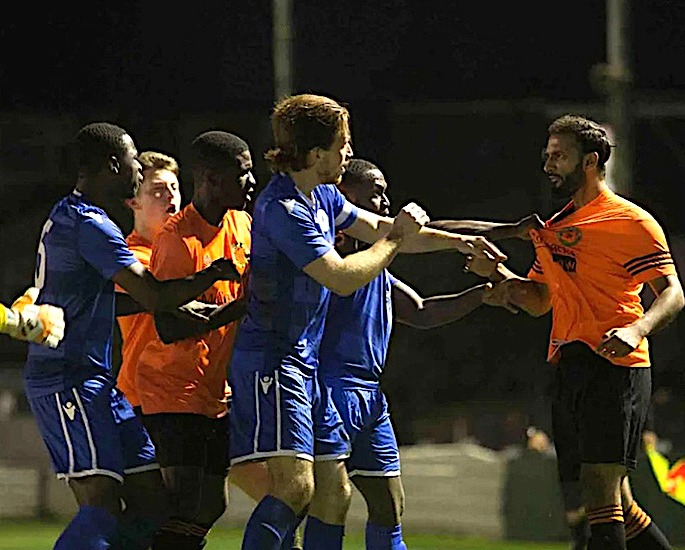
Football is a very competitive sport. Friendly six-a-side games between friends can turn into fierce battles; friendlies do not always end as such.
What cannot be excused, however, is when football racism enters the pitch via the players.
Football players using racial slurs during a game transforms a football pitch into a ground of hatred. Football, the most popular sport in the world, should be for everyone to enjoy.
Receiving comments of hate from fellow players eradicates this universality.
Arian Iqbal* who had excellent technical ability has many football racism stories. He exclusively told DESIblitz:
“We played a team with younger players in a Sunday league match. During the game, something happened between one of the players and my brother.
“They were arguing back and forth whilst I was playing. I was standing at the halfway line, waiting for the other team to kick off as we had just scored.
“The player arguing with my brother started saying racist stuff to me. He said. ‘P***”, “curry muncher and told me, ‘F*** off back to your own country.’
“I heard this and went to confront him. But unfortunately, the player got angrier, and other players had to get in the way.
“I was yellow carded as I ’caused the fight’; the other player was yellow carded too.
“The ref was told how the other player was racist, but the ref just said that he didn’t hear it.
“After the game, I told the opposition manager how shocked I was that an 18-year-old felt comfortable being racist like that during a football match.
“The manager told me he didn’t support racism. Ironically, when I told him which player had said these things, he turned out to be the manager’s son!”
Arian* then went on to share his emotions about such occurring incidents:
“When I was younger, it made me want to stop playing football. It makes you feel horrible, and no one understands how you feel.
“As you get older, you learn to deal with it better and move on from racist comments.”
Alarmingly, Arian’s story is one of many that he could have shared. But instead, the culmination of incidents almost tarnished his love for the sport.
His story speaks volumes and perpetuates the belief that football racism is still apparent within the sport.
FA work to eradicate Football Racism for British Asians
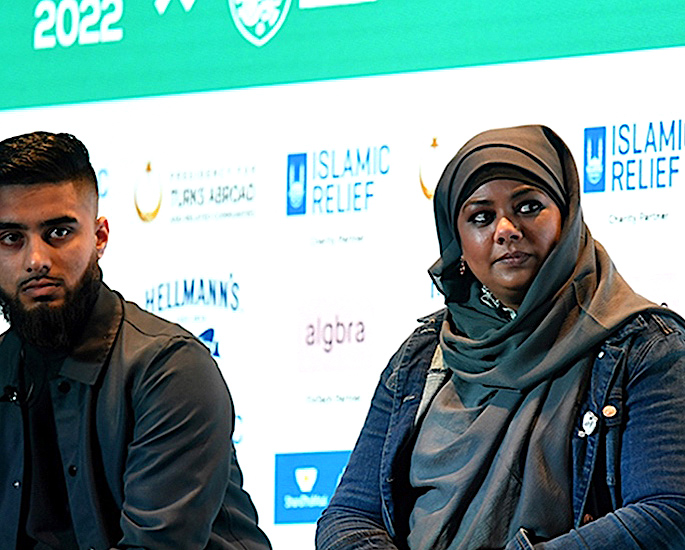
The Football Association (FA) are looking to make the beautiful game more inclusive for British Asians.
The FA are acting to increase the diversity within the game. Normalising a widespread South Asian involvement in the sport will only help eradicate notions of football racism.
If there were more British Asian footballers, managers, coaches, and referees, there would be less room for football racism.
The Football Association released an Asian Inclusion Update To Mark South Asian Heritage Month (July 18 – August 17, 2022).
Within the newsletter the FA elaborated on their findings:
“We’ve made good progress in this area in recent years, but we know there is more to be done to make the game more accessible for diverse communities on and off the pitch.
“We know that Asian communities make up England’s largest ethnic minority group.
“We’re dedicated to ensuring this is better reflected across our game.”
The Office of National Statistics released a breakdown of British demographics in 2019. British Asians were found to make up 7% of the UK population.
Though, in contrast, the population and the number of professional British Asian footballers is a sight for sore eyes.
Only 0.25% of British professional footballers are men with a British Asian background.
The FA uses strategies to help bridge the gap between population and participation.
The strategies include making inclusion a priority throughout its culture, developing coaches and supporting Asian fan groups across the sport.
These strategies look to enhance British Asian participation and progression within football.
The former academy players, which spoke to us allude to prejudices that limited their natural potential.
The FA are actively trying to make British Asian participation widespread so that football can eliminate preconceived notions.
With more British Asian participants in football, the likelihood of football racism occurring reduces.
Thus, with more South Asian coaches, scouts, referees, and players, the appreciation of British Asian talent will increase.
The Future of British Asians in Football

Football racism is a problem because it exists. Unfortunately, one incident of racism within the sport is one too many. Inspiringly, the future is looking like a brighter prospect.
In 2021, under the magical lights of Old Trafford, British Asians undoubtedly fulfilled a dream.
Coming on as a substitute, midfielder Zidane Iqbal made his debut during the game’s dying embers.
Iqbal became the first South Asian player ever to play for Manchester United against Berner Sport Club (BSC) Young Boys in the Champions League.
Along with the Manchester United star, more British Asian players have come to the forefront of the game. Midfielder Hamza Choudhury moved to Watford FC on loan in 2022.
Rising star and midfielder Arjan Raikhy was also loaned to Grimbsy Town in 2022.
Midfielder Simran Jhamat is trying to make an inroad with the Coventry United women’s team.
Kira Rai of Derby County is doing incredible work on and off the pitch to help increase inclusion in football.
These examples are a few British Asians making their name in professional football.
Hannah Kumari, with great hope for a brighter future, shares her belief that representation is getting better:
“As we start to see role models in both the men’s and women’s game, it naturally follows suit that young people are more likely to take up football.
“Earlier this year, the Premier League announced their ‘South Asian Action Plan’ in conjunction with Kick it Out.
“They aim to better identify talent among South Asian boys at ‘foundation phase’ age, between 8-12.”
“This will increase the number of players within the academy system. This will help, too.”
Hannah shares her appreciation for the work done by large football bodies.
Nilesh Chauhan is the founder of the inclusive fan group Villains Together. On top of his work to increase diversity within the stands, Nilesh coaches talented footballers.
Despite his optimism for the future of British Asian football, he still believes there is more work to do:
“The FA are doing a lot around South Asians in the game. It is excellent to see. It’s heading in the right direction, but we need to see more diversity at the broad level for clubs.”
Football racism is a product of hate. It is also a sign of a status quo that football, as a sport, must address.
The sport needs to normalise British Asian involvement to tackle football racism.
There has been an increase in British Asian talent taking on the main stages of football in both the women’s and men’s games.
Slowly but surely, increasing these superstars will mean football racism will dissipate.
The more British Asians we see under the lights of professional football, the less football racism will have a place within the beautiful game.




















































